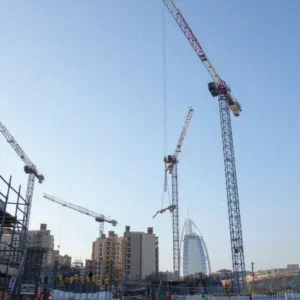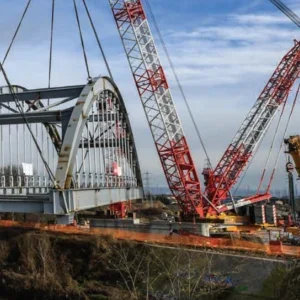When it comes to selling cranes, Freddie Bär is a legend. He joined Liebherr 45 years ago, aged 18. He set up and ran Liebherr GB in the 1960s and since 1972 has been managing director of Liebherr Werk-Ehingen. In his 30 years at Ehingen he has led the company to global leadership in the all terrain crane market.
More than this, he travels relentlessly, visiting customers and potential customers all over the world. As a consequence, everyone knows Freddie Bär. Not only is he one of the best known figures in the industry, he is also one of the best liked. He is the king of customer relations and has made a huge contribution to the crane industry.
At the end of the year, however, Bär is retiring and hands over the reins to a newcomer, Hans-Georg Frey. Frey joined Liebherr on 1 December 2001 to spend a year shadowing Bär in preparation for taking over as managing director. Bär is not retiring completely, you will be unsurprised to hear. He will be undertaking ‘special projects’ for Liebherr, though he is not ready to reveal what these might be.
Frey was previously managing director of Suessen, a company that makes textile machinery, so while he is only now learning about cranes he knows the capital equipment industry. He also knows something about the reputation of Liebherr, as he is from the southern part of Germany where there are several Liebherr factories. ‘The company has done an excellent job,’ he says. ‘It has built a really good business and helped the market to develop.’
Of course, Liebherr-Werk Ehingen is far more than just one man, but the departure of Bär could leave a big hole at Liebherr. The mobile crane market is down and a new production hall at Ehingen means that there is pressure on the company to increase sales.
To smooth the handover, Frey and Bär have this year embarked on what is effectively a world tour together. In the early part of the year they travelled to Thailand, Singapore and Australia. Next up is South America, then Japan, China, Korea and Taiwan, and then Russia and other eastern European countries. By June, they reckon that they will have covered most of the territories.
Frey seems reasonably relaxed about having the misfortune to start his new job just at a time when sales are likely to slow, at best, or dip. He accepts that cranes have a normal business cycle, he says, adding that he has seen it before in the textile machinery business. ‘We have to do our homework and work harder. I am coming from an industry that is having a tough time. I know what it means to roll up the sleeves and work hard.’
This is a theme that he returns to again, suggesting that there is no magic formula and no short cut to success. ‘The first, most important, thing is to continue the good work of the company. Secondly, we have to roll up our sleeves and work harder because the market is getting harder and the competition is getting harder. We are working hard on new [product] developments and that of course will continue.’






